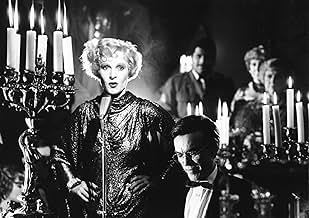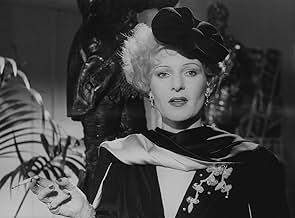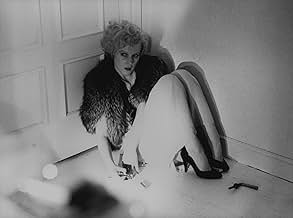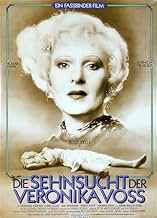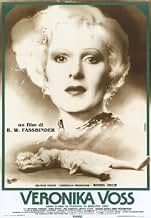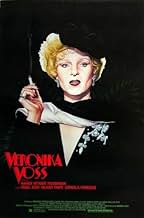IMDb-BEWERTUNG
7,6/10
8114
IHRE BEWERTUNG
WI fand Ruhm unter dem Nazi-Regime, aber Wald Karriere wurde danach zerstört, Veronika Voss ist eine einst prominente UFA Schauspielerin, gehalten von ihrem Arzt, wirft Verdacht in einem Spo... Alles lesenWI fand Ruhm unter dem Nazi-Regime, aber Wald Karriere wurde danach zerstört, Veronika Voss ist eine einst prominente UFA Schauspielerin, gehalten von ihrem Arzt, wirft Verdacht in einem Sportjournalist.WI fand Ruhm unter dem Nazi-Regime, aber Wald Karriere wurde danach zerstört, Veronika Voss ist eine einst prominente UFA Schauspielerin, gehalten von ihrem Arzt, wirft Verdacht in einem Sportjournalist.
- Regie
- Drehbuch
- Hauptbesetzung
- Auszeichnungen
- 4 Gewinne & 4 Nominierungen insgesamt
Günther Kaufmann
- G.I.
- (as Günter Kaufmann)
- …
Empfohlene Bewertungen
Like many other Fassbinder films "Die Sehnsucht der Veronika Voss" tells about a decline and is very depressing. It is a visually stunning film that shows how much Fassbinder admired the classical Hollywood cinema and especially the films of Douglas Sirk. Like the films of his idol this film is stylish and artificial to an extreme extent which creates quite a distance between itself and the audience. Probably an even greater distance, since the style and the artificiality are used more consciously here, even as a instrument of alienation. So it is more fascinating than touching or even moving and might leave one even cold. Nevertheless the story is intriguing and it really tells something about the post war society in West Germany, so the film is interesting and even fascinating to watch. The scene where Rosel Zech as Veronika sings "Memories Are Made Of This" is very haunting, a gem.
A man runs into a pretty but aging woman in the middle of a rainstorm. He politely protects her from the downpour with his umbrella, and even lifts her over a fence so she can get to her bus. He also gets on the bus, and, beginning to pant, she declares that she can't go near anyone else on the bus, because she's a famous actress and she'll be thronged. The other passengers on the bus look up at the exasperated woman, but don't pay her any more mind than that. A bit later, the woman proudly tells the man that she is Veronika Voss, and all he can do is politely nod. She hasn't been in a movie for three years, and hasn't been in a good one for longer than that. Veronika has to try really hard to pin the man, Robert, down and seduce him, and even when she accomplishes this feat he doesn't seem particularly interested. Robert's interest does grow when he begins to discover some nasty secrets about her life, notably that she is addicted to morphine. A strange doctor seems to be little more than a local drug dealer when he begins to look into the situation.
The plot is decent; it would have been a really good one for a classic Hollywood film starring Joan Crawford or Bette Davis or someone like that. Its greatest worth is in the performance of Rosel Zech, who has the titular role. Cornelia Froboess as Robert's girlfriend and Annemarie Düringer as the wicked doctor are also good. The character of Robert is never very interesting. The black and white cinematography (Xaver Schwarzenberger) and the unconventional score (Peer Raben) are very good. The tape I watched was not in a very good condition, so I may have liked it more if I had seen a better copy. 8/10.
The plot is decent; it would have been a really good one for a classic Hollywood film starring Joan Crawford or Bette Davis or someone like that. Its greatest worth is in the performance of Rosel Zech, who has the titular role. Cornelia Froboess as Robert's girlfriend and Annemarie Düringer as the wicked doctor are also good. The character of Robert is never very interesting. The black and white cinematography (Xaver Schwarzenberger) and the unconventional score (Peer Raben) are very good. The tape I watched was not in a very good condition, so I may have liked it more if I had seen a better copy. 8/10.
This sumptuous black and white period piece, tells the story of a once famous film star, Veronika Voss (Rosel Zech). After a chance encounter on a bus with Robert Krohn (Hilmar Thate), there lives are entwined, with Krohn finding himself trapped in a cat-and-mouse search for Voss's sanity, her past lives, and the many sycophants and gold diggers in 1950's Germany. Voss, now struggling to find work after a highly successful period, particularly in the 1940's, is addicted to drugs and alcohol and has paranoid delusions when out on the street; Krohn is pulled into this as he did not recognise who she was, and she vaguely sees him as protection.
One of the last of Fassbinder's films - he died of an overdose (the official conclusion was suicide) in 1982 - which was also the last of a trilogy focusing on Germany's economic boom in the 1950's (the others being The Marriage of Maria Braun (1979) and Lola (1981)), the film also reflects some of the themes that the New German Cinema at the time. It was a time that Germany was reflective of World War 2, and the trauma that prevailed in a country torn between guilt and a resurgence of decadence and wealth as in the 1920's Weimar Republic. It is stated in the film that Voss's best period was during this period, and that she had been the star of Nazi Germany. After the fall of Nazi domination, she was cast aside.
Like Billy Wilder's Sunset Boulevard (1950), Veronika Voss highlights an industry that can easily create monsters, and also devastate lives. But unlike Wilder's subtle version of lost fame, Fassbinder shows the devastating effects of drug addiction, and the underbelly of society that is encountered in this process. Historically though, this is deeper and a hell of a lot more emotionally charged and interesting than Sunset. After all, this is not a Hollywood story, but is a post-World War 2 story of judgement, and loss after such a integrally debasing event in human history. How do you continue after working under the despotic power of the Nazi party? The elements of Nazi Germany are still in process, in the form of Veronika's control.
The film is said to be based upon the real-life German film actress, Sybille Schmitz, who died of an overdose in 1955 at the tender age of 45. The film shows shows that the shadow of the war had a lasting effect on the German nation, that would take decades to come to terms with. This is film making par excellence. Haunting, beautiful, with a climax that is inevitable, shocking, but very satisfactory. Rosel Zech's performance is pitch perfect, her face in a constant state of anguish.
www.the-wrath-of-blog.blogspot.com
One of the last of Fassbinder's films - he died of an overdose (the official conclusion was suicide) in 1982 - which was also the last of a trilogy focusing on Germany's economic boom in the 1950's (the others being The Marriage of Maria Braun (1979) and Lola (1981)), the film also reflects some of the themes that the New German Cinema at the time. It was a time that Germany was reflective of World War 2, and the trauma that prevailed in a country torn between guilt and a resurgence of decadence and wealth as in the 1920's Weimar Republic. It is stated in the film that Voss's best period was during this period, and that she had been the star of Nazi Germany. After the fall of Nazi domination, she was cast aside.
Like Billy Wilder's Sunset Boulevard (1950), Veronika Voss highlights an industry that can easily create monsters, and also devastate lives. But unlike Wilder's subtle version of lost fame, Fassbinder shows the devastating effects of drug addiction, and the underbelly of society that is encountered in this process. Historically though, this is deeper and a hell of a lot more emotionally charged and interesting than Sunset. After all, this is not a Hollywood story, but is a post-World War 2 story of judgement, and loss after such a integrally debasing event in human history. How do you continue after working under the despotic power of the Nazi party? The elements of Nazi Germany are still in process, in the form of Veronika's control.
The film is said to be based upon the real-life German film actress, Sybille Schmitz, who died of an overdose in 1955 at the tender age of 45. The film shows shows that the shadow of the war had a lasting effect on the German nation, that would take decades to come to terms with. This is film making par excellence. Haunting, beautiful, with a climax that is inevitable, shocking, but very satisfactory. Rosel Zech's performance is pitch perfect, her face in a constant state of anguish.
www.the-wrath-of-blog.blogspot.com
10hasosch
Rainer Werner Fassbinder's second-but-last film does not show primarily the life and downfall of the UFA-star Sybille Schmitz, but gives, at the hand of the Schmitz-inspired, yet fictive character Veronika Voss an unvarnished and hopeless picture of the Bundesrepublik Germany in the 50ies. Part of Fassbinder's "BRD-Trilogy", it is also one of his 4 "women"-films, besides "Lola", "Maria Braun", and "Lili Marleen".
It is hard to say if the main focus of this movie is the former UFA-star Veronika Voss or the sports reporter Robert Krohn. One rainy night, he meets, in a little forest amidst of Berlin, a crying little bundle of mensch who seems to have completely lost her orientation. She is not so much thankful for his help but astonished that he does not recognize her: the great Veronika Voss. After he accompanies the woman to her door, she continues to occupy his mind. He asks his older colleagues who confirm him that she was once a movies' super-star, but now forgotten, divorced, impoverished, addicted and out of work. Soon, they meet again, and between Krohn, who is in a steady liaison, and Veronika, who sees in him one of her once many admirers, a very problematic love story starts which costs two humans' lives, leaves an investigative mind back in despair, discloses the corruption between medicine and politics and portrays the deterrent situation in the post-war German film industry which used his former flagships as fuel.
R.W. Fassbinder got for this films the "Golden Bear" out of the hand of Jimmy Stewart who was his friend for many years. Fassbinder had been nominated for the highest German film price since a long time, but it was Stewart who realized that soon it might come too late. Fassbinder passed away only a few days after having received the Golden Bear.
It is hard to say if the main focus of this movie is the former UFA-star Veronika Voss or the sports reporter Robert Krohn. One rainy night, he meets, in a little forest amidst of Berlin, a crying little bundle of mensch who seems to have completely lost her orientation. She is not so much thankful for his help but astonished that he does not recognize her: the great Veronika Voss. After he accompanies the woman to her door, she continues to occupy his mind. He asks his older colleagues who confirm him that she was once a movies' super-star, but now forgotten, divorced, impoverished, addicted and out of work. Soon, they meet again, and between Krohn, who is in a steady liaison, and Veronika, who sees in him one of her once many admirers, a very problematic love story starts which costs two humans' lives, leaves an investigative mind back in despair, discloses the corruption between medicine and politics and portrays the deterrent situation in the post-war German film industry which used his former flagships as fuel.
R.W. Fassbinder got for this films the "Golden Bear" out of the hand of Jimmy Stewart who was his friend for many years. Fassbinder had been nominated for the highest German film price since a long time, but it was Stewart who realized that soon it might come too late. Fassbinder passed away only a few days after having received the Golden Bear.
A famous German actress, Veronika Voss (Rozel Zech) in her forties tries to revive her career while struggling with alcohol and drugs in the final chapter to Fassbinder's trilogy about collapse of the West German postwar dream. The film was inspired by the tragic life of famous UFA actress, Sybille Schmitz (1909-1955). She began her career in the films by the giants such Georg Wilhelm Pabst and Carl Theodor Dreyer and soon became one of Germany's beloved actress. Everything changed during the WWII and especially after its end.
Fassbinder's film which was shot in black and white visually is very impressive. "Light and shadows are two cinema's best secrets" says Veronika in the movie and light and shadows make the film a joy to behold. I like it but I think it is the weakest part of the trilogy perhaps because "Lola" and "Maria Braun" are so strong. I found the documentary about Sybille Schmitz, "Dances with Death" which is included on Criterion DVD much more compelling.
Veronika - 7/10 Dances with Death 8.5/10
Fassbinder's film which was shot in black and white visually is very impressive. "Light and shadows are two cinema's best secrets" says Veronika in the movie and light and shadows make the film a joy to behold. I like it but I think it is the weakest part of the trilogy perhaps because "Lola" and "Maria Braun" are so strong. I found the documentary about Sybille Schmitz, "Dances with Death" which is included on Criterion DVD much more compelling.
Veronika - 7/10 Dances with Death 8.5/10
Wusstest du schon
- WissenswertesBased on the true story of German film star Sybille Schmitz.
- PatzerThe film is set in 1955 but the song "The Battle of New Orleans" by Johnny Horton, released in 1959, is heard on the radio a number of times.
- Zitate
Dr. Marianne Katz: Artists are different from ordinary people. They are wrapped up in themselves, or simply forgetful.
Top-Auswahl
Melde dich zum Bewerten an und greife auf die Watchlist für personalisierte Empfehlungen zu.
- How long is Veronika Voss?Powered by Alexa
Details
- Erscheinungsdatum
- Herkunftsland
- Sprachen
- Auch bekannt als
- Veronika Voss
- Drehorte
- Produktionsfirmen
- Weitere beteiligte Unternehmen bei IMDbPro anzeigen
Box Office
- Budget
- 2.600.000 DM (geschätzt)
- Bruttoertrag in den USA und Kanada
- 8.144 $
- Eröffnungswochenende in den USA und in Kanada
- 11.623 $
- 16. Feb. 2003
- Weltweiter Bruttoertrag
- 8.158 $
- Laufzeit1 Stunde 44 Minuten
- Farbe
- Sound-Mix
- Seitenverhältnis
- 1.66 : 1
Zu dieser Seite beitragen
Bearbeitung vorschlagen oder fehlenden Inhalt hinzufügen

Oberste Lücke
By what name was Die Sehnsucht der Veronika Voss (1982) officially released in India in English?
Antwort
